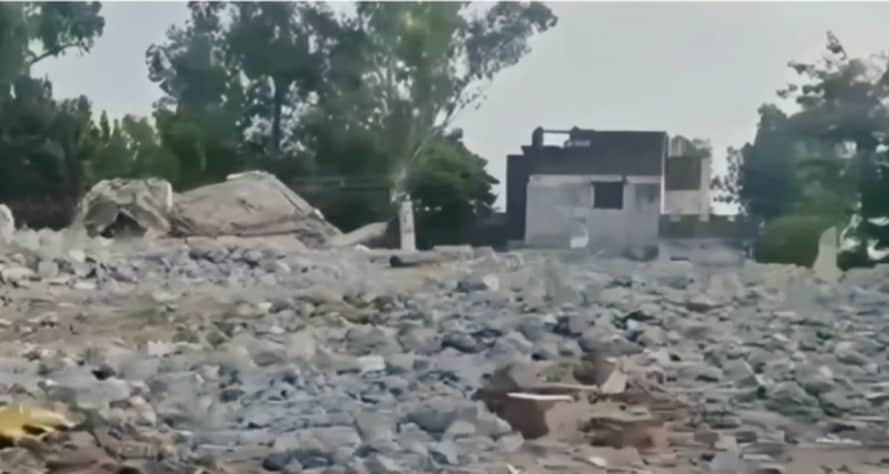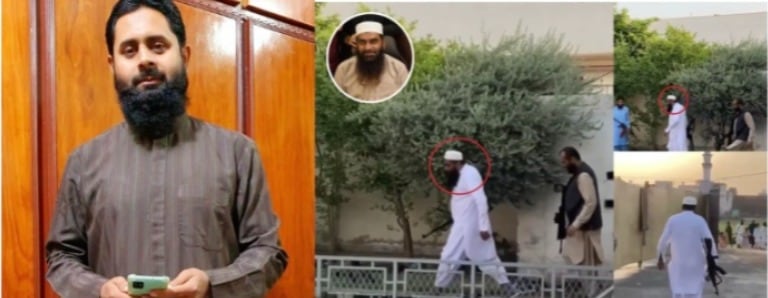- Lashkar-e-Taiba is rebuilding its Muridke headquarters, which was destroyed during Operation Sindoor
- The terror outfit aims to reopen the rebuilt complex by February next year
- Pakistan has pledged financial aid for LeT, according to a dossier prepared by Indian intelligence agencies
The Lashkar-e-Taiba (LeT) terror outfit is quietly orchestrating the reconstruction of its demolished headquarters, Markaz Taiba in Muridke of Pakistan's Punjab, following its destruction by the Indian armed forces on May 7 during Operation Sindoor, according to the dossier prepared by India's intelligence agencies that NDTV exclusively accessed.
At 12:35 am Pakistan Standard Time, the Indian armed forces struck three core structures within the 1.09-acre Markaz Taiba campus in Punjab province. The targets included a red multi-story block used for cadre accommodation and weapons storage, and two yellow-painted buildings known as Umm-ul-Qura, which served as training facilities and senior commander residences.
Only skeletal remnants remained standing, with analysts praising the Indian strike as the most severe blow dealt to Lashkar's infrastructure since the 2008 Mumbai attacks.
Demolition And The Road To Rebirth
By August 18, LeT deployed heavy machinery, razing the already crippled structures. HUMINT-sourced video reveals rubble-strewn grounds and cadres supervising clearance.

Demolished red building
On September 4, the yellow Umm-ul-Qura block was reduced to dust. Three days later, the red building followed suit.
The group now eyes February 5, 2026 - Kashmir Solidarity Day - as the symbolic deadline to inaugurate the reconstructed complex, timed with its annual convention. Intelligence suggests that the rebuilt Markaz will once again serve as the epicentre of training, indoctrination, and operational planning.
Leadership In Command
The reconstruction drive is being personally overseen by Maulana Abu Zar, the director of Markaz Taiba, LeT's chief trainer, revered as Ustad ul Mujahiddin and Yunus Shah Bukhari, the commander with operational oversight.

Maulana Abu Zar (L) and Yunus Shah Bukhari
The outfit temporarily relocated its training wings to Markaz Aqsa in Bahawalpur and later to Markaz Yarmouk in Patoki, Kasur district, under Abdul Rashid Mohsin, a trusted aide of deputy chief Saifullah Kasuri.
Pakistan's Pivotal Role
According to the dossier, Islamabad publicly pledged financial assistance for LeT and Jaish-e-Mohammed (JeM) facilities that were destroyed during Operation Sindoor.
In August, LeT received PKR 4 crore (around Rs 1.25 crore) from the Pakistani government as seed money. Insiders estimate that the total cost of restoration will exceed PKR 15 crore (around Rs 4.7 crore).
The revelation lays bare the double standards of Pakistan's counterterrorism posture. While posturing at global forums as a victim of extremism, the state actively bankrolls outfits waging bloodshed across the border.
Fundraising Under Humanitarian Guise
To plug the financial gap, LeT has also launched a fundraising campaign disguised as flood relief operations.
Cadres, often flanked by Pakistani Rangers, stage photo opportunities distributing token supplies before diverting the bulk of donations to Muridke's resurrection.
The pattern is eerily familiar. After the 2005 earthquake in Pakistan and Pakistan-occupied Kashmir (PoK), LeT (then fronting as Jamaat-ud-Dawa) raised billions in the name of humanitarian aid. Subsequent investigations revealed that 80 per cent was funnelled into terror infrastructure, including the construction of Markaz Abbas in Kotli, which was also destroyed during Operation Sindoor.
The Proxy War Endures
Despite Operation Sindoor's tactical success, LeT's rapid rebound demonstrates its enduring resilience. The group's planned unveiling of a rebuilt Markaz by February 2026 serves as both defiance and propaganda, reaffirming its centrality in Pakistan's proxy war against India.
LeT's mushrooming proxy fronts - The Resistance Front (TRF), People's Anti-Fascist Front (PAFF), Kashmir Tigers, and the Mountain Warriors of Kashmir (MWK) - allow Islamabad plausible deniability while maintaining a constant stream of anti-India violence.
The case of Muridke epitomises the entrenched nexus between Pakistan's state apparatus and terror outfits. Far from curtailing terror, Islamabad's funding, facilitation, and indifference ensure that groups like LeT not only survive but expand.
Operation Sindoor
India, after finding cross-border links to the April 22 Pahalgam attack, which left 26 civilians dead, launched Operation Sindoor on May 7 and attacked multiple terror sites in Pakistan and PoK.
The Indian armed forces destroyed multiple camps of terror groups like LeT, JeM and Hizbul Mujahideen, and killed more than 100 terrorists.
After India's overnight operation, the Pakistani Army launched drones and missiles at India, which were successfully intercepted. India then hit selected military targets deep inside Pakistani territory.
The two countries reached a ceasefire agreement on May 10.
Track Latest News Live on NDTV.com and get news updates from India and around the world

